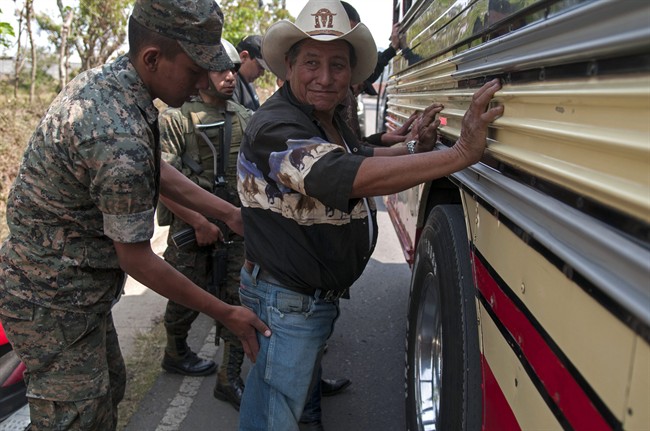XALAPAN, Guatemala – Guatemala’s government declared a state of emergency and banned public gatherings in four townships east of the capital Thursday following several days of violent clashes between police and anti-mining protesters.

The confrontations, which began over the weekend, have left one policeman dead, six residents wounded by rubber bullets, and police patrols and other cars burned. Twenty-three police officers were briefly held by protesters before being freed.
“The investigation has revealed that a series of criminal acts were committed, from murder to kidnapping to the destruction of government property,” said President Otto Perez Molina, explaining why he declared a state of emergency for the townships in the states of Jalapa and Santa Rosa.
The government sent in 500 police officers and 2,000 soldiers, some in armoured personnel vehicles. It said protesters were armed with guns and explosives. Clashes have involved police, mine security guards and local protesters.
Residents of the area are mainly members of the Xinca indigenous group. They claim the Canadian-owned Escobal silver mine, known locally as the San Rafael mine, threatens their local water sources.
The mine’s owner, Vancouver-based Tahoe Resources Inc., said protesters armed with machetes “turned hostile” at the gate on Saturday, and security guards fired tear gas and rubber bullets to ensure the security of mine personnel. Six protesters were wounded by rubber bullets.
Ira Gostin, vice-president of investor relations for Tahoe Resources, said complaints that the mine could affect the water springs “are totally unfounded.”
The mine has received permits to operate but is not yet operating.
In the village of Xalapan, where some charred vehicles littered the streets, dozens of police officers and soldiers patted down residents and searched house-by-house for people suspected in inciting violence. Those arrested were taken to a soccer field in a nearby town.
Deputy Interior Secretary Eddy Juarez, who went to area Thursday, told The Associated Press that 17 people have been arrested and there are arrest warrants for at least 30 more.
Earlier Thursday, Interior Secretary Mauricio Lopez Bonilla said security forces had recovered several weapons and shotguns.
Residents remained calm and allowed authorities to enter their homes.
“I don’t intervene because I’m poor and I have to work to support my family but the truth is that the mine does affect us when it comes to the environment,” said Mariano Lopez Escobar, who lives in Xalapan, and watched as officials raided homes nearby. “Although, it sounds like that with an order from the president for the mine to start working there isn’t much one can do.”
The emergency decree covers the townships of Jalapa, Mataquescuintla, Casillas and San Rafael Las Rosas in Jalapa and Santa Rosa states. It restricts constitutional rights such as freedom of movement, the right to bear arms, freedom of association and demonstration.
The government ordered it for 30 days, but Guatemalan lawmakers have yet to approve the duration of the state of emergency.
Protesters temporarily detained 23 police officers, seizing their firearms before releasing them. Later, in a nearby town, another officer was shot and killed in a confrontation possibly related to the mine clashes.
Yuri Melini, the director of the Legal Action Center for Human Rights, said “we believe that if crimes have been committed, they should be prosecuted, but the community’s legitimate right to oppose the mine should not be criminalized.”

Comments